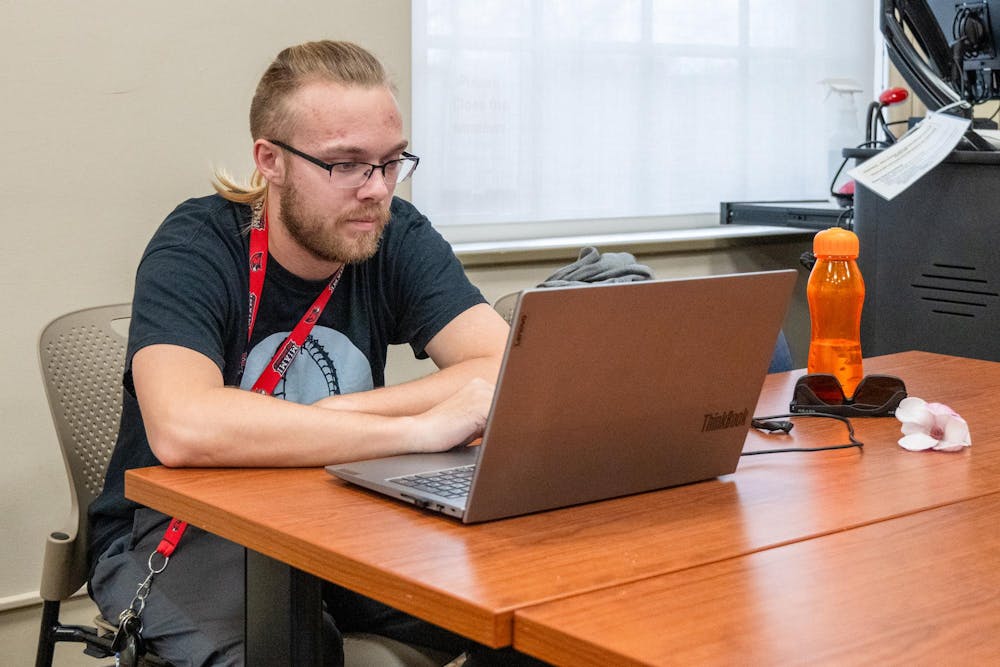In March, President Donald Trump signed his 95th executive order: plans to begin dismantling the Department of Education (ED).
According to the order, “closing the Department of Education would provide children and their families the opportunity to escape a system that is failing them,” and it will attempt to address “historic lows” in student testing scores.
While dismantling the entirety of the department itself will likely require an act of Congress, Trump’s decision allows the U.S. Secretary of Education, Linda McMahon, to begin breaking down certain aspects of the nearly 50-year-old department.
In addition to Trump’s executive order, higher education at the state level has also seen changes in legislation, such as Ohio’s Senate Bill 1, which sparked protests on campuses across Ohio, including Miami University.
While federal and state changes to higher education have not yet gone into effect, students are already anticipating the impact. Senior social work and social justice major Mónnica Gay said that while she is graduating in May, she is concerned about how changes in education will impact her 13-year-old sister.
“I’m nervous. I’m really, really scared,” Gay said. “I’m mostly scared for [my sister’s] education because I’m on my way out the door. I feel like I got kind of lucky in a weird way of getting the very last moments of when education was at least a little more what I would say [is] normal.”
Enjoy what you're reading?
Signup for our newsletter
A brief history of the ED
In 1979, former President Jimmy Carter signed a law separating federal oversight of education from the U.S. Department of Health, Education and Welfare (now the Department of Health and Human Services) into an independent department: the Department of Education.
This decision came after almost 15 years of federal educational development when former President Lyndon B. Johnson signed the Elementary and Secondary Education Act in 1965, which included Title I to further support low-income students. Ten years later, Congress established the Education for All Handicapped Children Act, now the Individuals with Disabilities Education Act, which helps states support students with disabilities.
With the ED, Carter “sought to address systemic inequities and ensure equal access to quality education for all students” by consolidating federal oversight of education.
Miami has not released any public statements on changes that students, faculty and staff may experience regarding federal student aid (FSA) or protections on student civil rights, such as Title IX and sex-based discrimination.
“The university continues to review the executive order internally and does not intend to comment,” Seth Bauguess, a spokesperson for University Communications, wrote in an email to The Miami Student.
Impact on FSA
Since 1965, the federal government has overseen financial aid for higher education. According to the department’s website, the ED is responsible for more than $120 billion in low-interest student loans, grants and work-study funds for 13 million students yearly.
Every year, millions of students file the Free Application for Student Aid (FAFSA), which is then processed by the ED. Depending on where they attend school, students select where they would like their FAFSA loan or grant sent. After that, each school can provide students with these funds via the institution’s federal funding.
By dismantling the ED, student loan disbursement and repayment would have to be transferred to a different federal office for oversight, though this has yet to happen.
Beth Johnson, Miami’s director of student financial assistance, said the university has yet to receive correspondence on what this may look like.
“[The executive order] initially directed the Department of Education to come up with a plan to get rid of itself within six months,” Johnson said, “and then later it was more clarified to basically direct [the department] to come up with what they do that’s not in statute, and then possibly those [responsibilities] would go somewhere else. So it went from abolishing, to maybe dismantling or rearranging of duties.”
While formal changes are yet to be made, Johnson said the displacement of federal aid oversight may confuse FAFSA recipients.
“I think [dismantling the ED] could also create massive uncertainty for the millions of students and borrowers that are out there,” Johnson said. “Without a federal body, it’s unclear who would manage loan payments and forgiveness programs, so borrowers could face maybe a chaotic transition or lose some of the federal benefits.”
According to Trump, federal oversight of the FSA service will transfer to the Small Business Administration. This includes the entirety of the student loan portfolio, totaling $1.6 trillion in outstanding loans for 43 million borrowers.
With such large amounts of money involved, tangible changes felt by Miami’s financial aid office and student recipients will likely take a long time.
“I think one thing that is important to know is this is a significant move that would require a huge reorganization of how the U.S. supports higher education,” Johnson said. “And I think it would not be a fast transition. I think this is something that could take years to rebuild.”
During her senior year, Gay received a Pell Grant as part of her financial aid package. During the 2022-2023 school year, as most recently reported, 13% of Miami students received this type of aid.
One benefit of FSA for Gay is the flexibility it provides her, allowing her to be involved in student organizations, like theLatiné Student Alliance, in which she serves as president, and holding membership in the Pi Gamma Chapter of Sigma Lambda Gamma National Sorority, Inc.
“I would not be at Miami doing all the things that I do and having all the involvements that I have if not for FAFSA,” Gay said.
Gay also emphasized how FSA allows students from lower-income backgrounds to receive an education and possibly get out of a difficult financial situation.
“I feel like when we talk about … all sorts of systemic marginalization, the key out and the way we always talk about getting out of your situation … is education,” Gay said. “So if we are eliminating the option for people of lower socioeconomic status to get that education, we are completely perpetuating the cycle of poverty.”
Title IX
The Office for Civil Rights (OCR) exists as part of the ED to protect student civil rights in schools at all levels. In 1972, Title IX was written into law as a protection against sex-based discrimination in education, which is overseen and enforced by the OCR.
Title IX applies in and out of the classroom for students at all institutions that receive federal financial assistance.
At Miami and other universities, this is the office where students file reports of sexual harassment and assault. For many, this has been a way to seek justice after an act of sexual violence.
“I’m sure so many people, including myself, know victims and survivors of sexual assault that have had their life completely changed by the incident itself, but mostly by the aftermath and trying to get justice for themselves, against the perpetrator,” Gay said. “And it’s already so, so difficult, so eliminating and lessening the impact of Title IX is going to make it near impossible. It’s going to make any sort of harassment [or] sexual assault seem nearly admissible …”
Similar to procedures for FSA, changes have yet to be formally made regarding Title IX procedures on campus.
“The university continues to enforce the 2020 Title IX regulations and no changes have been made related to the Clery and SAVE Acts at this time,” Bauguess wrote in the same statement.
In addition to protections for diverse students, Title IX has also impacted legislation like the Clery Act and SAVE Act.
The Clery Act was passed in 1990 and requires universities to report crime data that occurs on campus, in addition to publishing procedures taken to expand campus safety. In 2013, The Campus SAVE Act was passed as an amendment to the Clery Act, requiring universities to report more specific crime statistics on interpersonal and sexual violence.
Following the beginning of Trump’s second term, universities received a “Dear Colleague” letter informing institutions that they must adhere to 2020 Title IX guidelines. These guidelines differ from the previous administration, as former President Joe Biden rewrote Title IX guidelines while in office to include more protections for gender minorities, the LGBTQ+ community and pregnant students.
However, these were eliminated to revert to Title IX protections introduced under Trump’s first administration.
As the new administration continues rolling out federal changes, nonprofits have begun responding.
A Better Balance is a “legal advocacy organization dedicated to promoting justice in the workplace, especially for women, caregivers, and people with health needs of their own.”
In a press release to The Miami Student, President of A Better Balance Inimai Chettiar commented on how marginalized students may be impacted if Title IX remains at risk.
“This represents an attack on all students, but especially groups that are more susceptible to discrimination, like LGBTQ+ students and pregnant students,” Chettiar said. “... This is a huge overstep of power that will nonetheless have a devastating impact for students, their families, and the overall fight for gender equity. We will fight back.”
In addition to A Better Balance, It’s On Us, a non-profit fighting against sexual assault on college campuses, also released a statement sent to The Miami Student.
“[The] executive order directing the Secretary of Education to take all necessary steps to facilitate the closure of the Department of Education and shift authority to the states will cause immeasurable, immediate harm to the millions of children and young adults enrolled in our nation’s schools,” executive director Tracey Vichers said. “... It’s On Us calls on the administration to immediately share their plans for enforcement of Title IX and other fundamental civil rights protections for our nation’s students.”
Students, faculty, staff and advocates remain waiting to see how these changes will unfold, though this has not stopped these groups from speaking out.
“I feel like at this point, everyone should be concerned,” Gay said. “This is no longer something that just targets specific identity groups … in the situation we are currently in, I don’t think anyone can say they won’t be affected in the slightest because I feel like the amount of people that will not be affected is so few that it almost doesn’t exist.”




